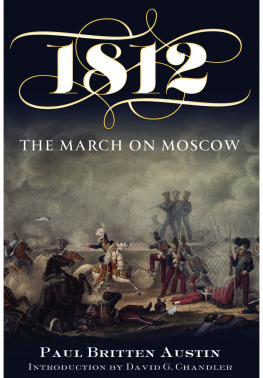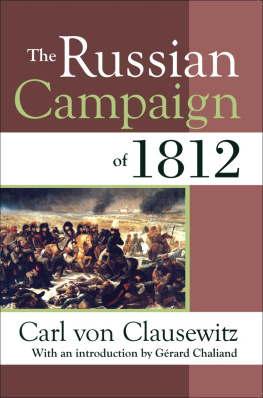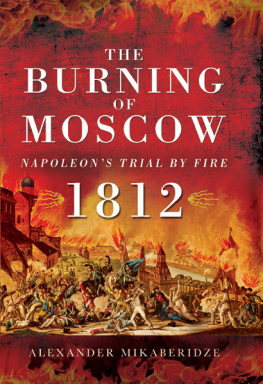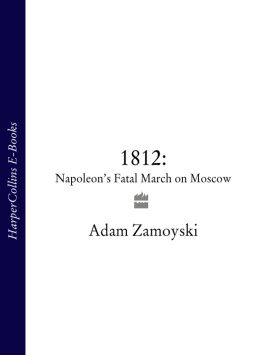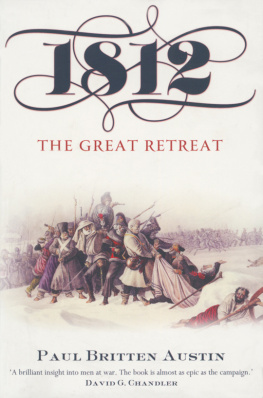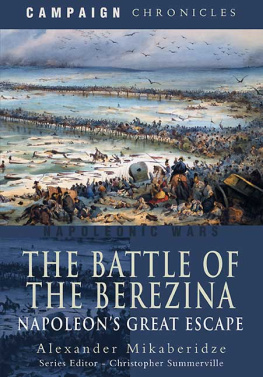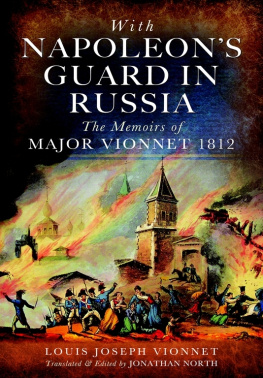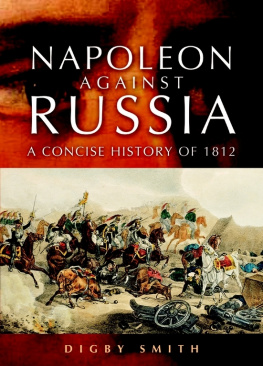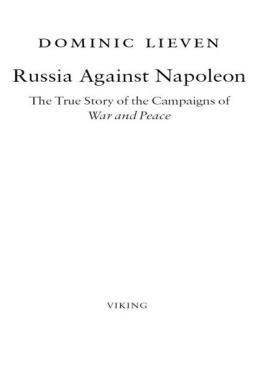1812
THE MARCH ON MOSCOW
It is for posterity to judge whether I made a mistake in going to Moscow.
Napoleon, at St Helena
When I read history, which is a subject for everyone, Ive made a habit of taking into account who the writer is. When they are soldiers, one looks to matters concerning their profession and, more especially, to descriptions of actions in which they have themselves taken part.
Montaigne: Essaies
Reading modern history is generally the most tormenting employment a man can have: one is plagued with the actions of a detestable set of men called conquerors, heroes, and great generals, and we wade through pages loaded with military detail
Arthur Young (17411820)
I always prefer an eye-witness to a line of reasoning.
Baron Fain: Mmoires
1812
THE MARCH ON
MOSCOW
PAUL BRITTEN AUSTIN
Foreword by David G. Chandler
A Greenhill Book
First published in Great Britain in 1993 by
Greenhill Books, Lionel Leventhal Limited
www.greenhillbooks.com
This paperback edition published in 2012
by Frontline Books
an imprint of
Pen & Sword Books Ltd
47 Church Street
Barnsley
South Yorkshire
S70 2AS
Copyright Paul Britten Austin, 1993
The right of Paul Britten Austin to be identified as the author
of this work has been asserted by him in accordance with the
Copyright, Designs and Patents Act 1988
ISBN 978-1-84832-704-7
All rights reserved. No part of this publication may be reproduced, stored
in or introduced into a retrieval system, or transmitted, in any form, or
by any means (electronic, mechanical, photocopying, recording or
otherwise) without the prior written permission of the publisher. Any person
who does any unauthorized act in relation to this publication may be liable
to criminal prosecution and civil claims for damages.
CIP data records for this title are available from the British Library
For more information on our books, please visit
www.frontline-books.com, email info@frontiine-books.com
or write to us at the above address.
Printed and bound by CPI Group (UK) Ltd, Croydon, CR0 4YY
CONTENTS
To my son THOM
and my grandson BENNY
without whose patient encouragement
and computer expertise this work
would never have been possible.
BY DAVID G. CHANDLER,
M.A. (OXON.), D.LITT., F.R.HIST.S., F.R.G.S
HEAD, DEPARTMENT OF WAR STUDIES, R.M.A. SANDHURST
O f all the many campaigns of war throughout History from the onset of the age of gunpowder down to the opening of the 20th century, Napoleons invasion of Tsarist Russia in 1812 is probably the best known throughout the world and for good reason. In terms of scale, both of man-power engaged and of geographical extent, the only applicable word is epic. Well over half a million of Napoleons soldiers were involved, and eventually almost as many warriors of Alexander I. From Berlin to Moscow is one thousand miles, and for the French and their allies seven hundred of these, once the River Niemen had been crossed, were through hostile and mainly barren expanses of forest and plains. For Napoleon the Niemen was to prove his Rubicon: fateful and irreversible results were to follow leading to his twin downfalls first in April 1814, then (after the episode of exile in Elba) the ultimate cataclysm of Waterloo in 1815. The scale of operations in 1812 almost beggar belief, and the casualties military and civilian, French invaders and Russian defenders cause a shudder even today, despite the horrendously greater losses of two successive World Wars in the 20th century. But it must be remembered that populations were far smaller in 1812 than in either 1914 or 1939 so proportionately there is less differentiation than at first appears to be the case.
The famous Prussian soldier-philosopher-historian, Carl von Clausewitz, once called warfare a passionate drama. So it is to be sure and one major attribute of this new treatment of an old subject by Paul Britten Austin is his use of the words, recollections and, occasionally incorrect, memories for the passage of time can play the strangest tricks with human memory, as every historian who has ever attempted to debrief or question old soldiers will be only too well aware of one hundred and more survivors who participated in the dramatic events of one hundred and eighty-one years ago in eastern Europe. The bare historical events have been recounted time and again there have been four notable treatments in the last five years alone but there has never been one quite like this before or on such a scale.
For it is the story of 1812 as seen by eye-witnesses French, Russian, Ukrainian, Germans of many kinds and Italians prominent amongst them of many ranks and military as well as civilian avocations that forms the main focus of this new treatment; in other words, the human angle. War, when all is said and done, is about human beings under the combined stresses in multi-variant proportions of discomfort, hunger, homesickness, boredom and danger, with occasional brief minutes of sheer elation or absolute terror thrown in to add a little spice as it were.
To borrow a proposition from Euclid, the Ancient Alexandrian geometrician, a whole is the sum of all of its parts. On both sides, over a million armed men including some women fighting in Davydovs irregular partisan bands and perhaps three more million civilians, became directly involved in one way or another in Napoleons invasion of Russia and the subsequent cataclysm that overwhelmed his army. Over 650,000 Frenchmen and their allies entered Russia (to include reserves); only an estimated 110,000 lived to pass back over the River Niemen (to include the forces on the flanks and retiring ahead of the main army group) and probably as many as 75% of the survivors were suffering from starvation, frost-bite, wounds and illnesses from which they soon died or remained crippled by for the rest of their lives. The armies and inhabitants of Holy Russia certainly fared even worse, although they had the solace of ultimate victory over a foreign enemy led by one of the two greatest military geniuses of all History. More we shall never know.
Of the active and literate participants, Paul Britten Austin has woven together the stories of 100 human beings or one ten thousandth part of the men who shared in this campaign, a mere 0.1%, a tenth of a tenth of a tenth part. He has needed all of 400 pages to bring us from the unopposed crossing of the River Niemen on 21 June with barely a foe in sight to the French occupation of a deserted Moscow just 85 days later. Martial events both great and small crowd his canvas ranging from huge set-piece battles such as Borodino or Smolensk to tiny skirmishes and outpost actions that never received a name. But what lay beyond Moscow? We know the bare historical facts, to be sure: Napoleons lingering for a month in Moscow hoping for peace-overtures from Tsar Alexander which never came: the start of the long retreat in fine autumnal weather; the unnecessary check at Malojaroslavetz; the fatally redesignated line of retreat past Borodino to Smolensk as the weather changed for the worst; battles of all shapes and sizes with the harrying and pursuing Russians under command of Kutusov at such places as Krasnoe and Orsha; the huge drama of the crossing of the River Beresina under close enemy fire; the fate of the straggling thousands; the breakdown of formation cohesion and individual discipline as the survivors deserted by their Emperor from 5 December as he headed back for Paris to quell rumours of his supposed death, to crush conspiracies, and above all to start building a new army ready to meet the advancing Allied hordes of the Sixth Coalition limped back through rapidly deteriorating weather conditions, the temperature plummeting to minus 30 degrees on some occasions and the casualty figures from exposure to the elements rather than the foe soaring; and then, the very last man of all to leave the soil of Holy Mother Russia the totally unrecognizable Marshal Ney, already dubbed the bravest of the brave by his master on his rag-wrapped feet, unshaven and unwashed after ten days of desperate actions in command of the rearguard, a private-soldiers musket carried in the crook of his left arm: all this has still to come in an eagerly-awaited second volume.
Next page
